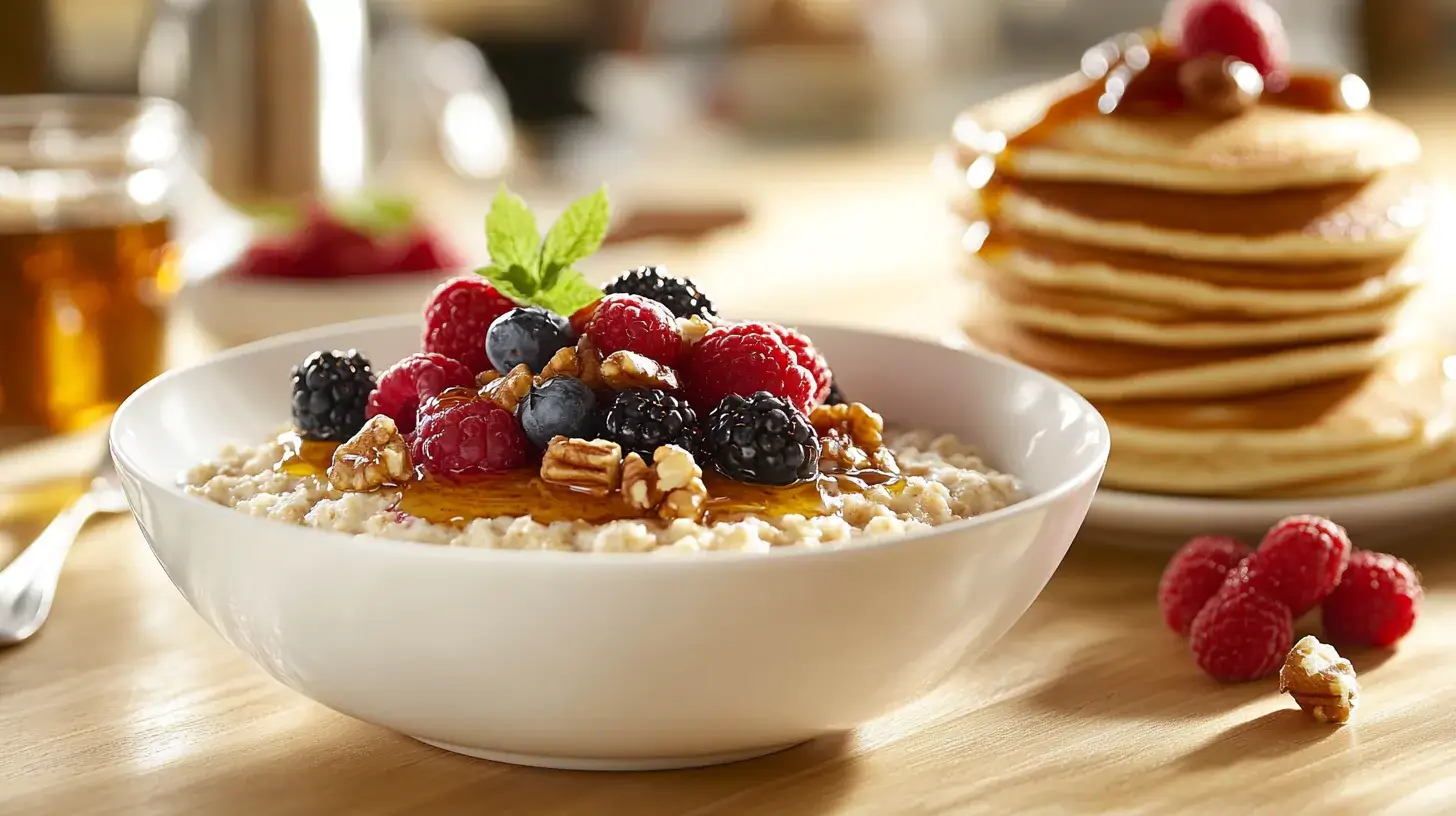Is Oatmeal Better for You Than Pancakes?
Introduction
When it comes to breakfast, oatmeal and pancakes are two staples that often compete for a spot on the table. But have you ever wondered which one is better for your health? Oatmeal provides heart-healthy benefits and a high fiber content, while pancakes offer the comfort of a classic food that you can adapt in countless ways
Both options have their merits, but understanding the nutritional differences, health benefits, and preparation methods can help you make an informed choice. Whether you’re seeking a wholesome start to your day or a satisfying weekend treat, this article will explore the pros and cons of both oatmeal and pancakes. Plus, we’ll share tips for making each healthier, including a recipe for 3-ingredient oatmeal pancakes
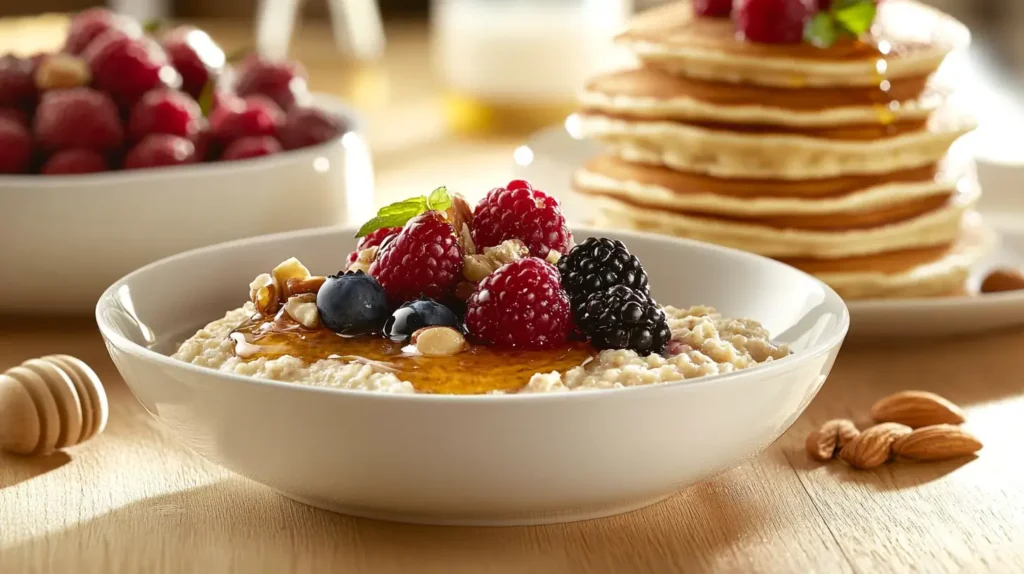
Table of contents
Nutritional Comparison
Macronutrient Profile: Oatmeal vs Pancakes
When comparing oatmeal and pancakes, the macronutrient profile is one of the most critical aspects. Oatmeal is naturally rich in complex carbohydrates and dietary fiber, making it a slow-digesting energy source. A typical serving of plain oatmeal (1/2 cup dry) contains about:
- Calories: 150
- Protein: 5 grams
- Fat: 3 grams
- Carbohydrates: 27 grams
- Fiber: 4 grams
In contrast, traditional pancakes made from refined flour are often lower in fiber and protein but higher in carbohydrates. A single medium pancake (4 inches in diameter) contains approximately:
- Calories: 86
- Protein: 2 grams
- Fat: 2 grams
- Carbohydrates: 14 grams
- Fiber: 0.5 grams
While oatmeal provides more sustained energy due to its fiber content, pancakes are more likely to cause rapid spikes in blood sugar, especially when topped with syrup or powdered sugar.
Micronutrient Content: Which Provides More Vitamins and Minerals?
Oatmeal is a powerhouse of essential nutrients like manganese, magnesium, phosphorus, and zinc. It also provides a small but significant amount of iron and B vitamins. On the other hand, pancakes made from refined flour are often fortified with similar nutrients, but their overall micronutrient density depends heavily on the ingredients used.
If you add whole grains or oats to pancake batter, you can boost their nutritional value. For example, recipes like 3-ingredient oatmeal pancakes offer the benefits of both oats and pancakes in a single dish.
Caloric Differences and Their Impact on Health
Calories can be a deciding factor when choosing between oatmeal and pancakes. Preparing oatmeal with water and minimal sweeteners reduces its calorie count compared to a stack of pancakes topped with butter and syrup
For weight management, oatmeal is often the preferred option. However, you can make pancakes healthier by using whole-grain flour, cutting back on sugary toppings, and adding nutrient-dense ingredients like fruits or nuts. Small changes can make a big difference in how your breakfast impacts your daily caloric intake.
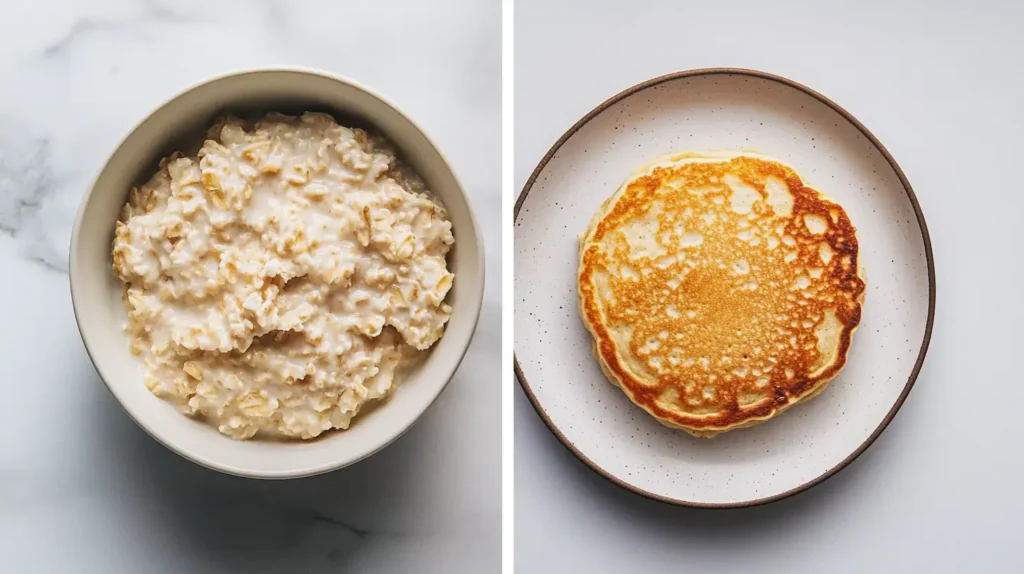
Health Benefits of Oatmeal
Heart Health: How Oatmeal Supports Cholesterol Levels
Oatmeal is widely celebrated for its heart-friendly properties. Its secret lies in beta-glucan, a soluble fiber that helps lower LDL (bad cholesterol) levels. Studies suggest that consuming just 3 grams of beta-glucan daily (found in about 1.5 cups of cooked oatmeal) can significantly reduce cholesterol levels and improve cardiovascular health.
Additionally, the high magnesium and potassium content in oatmeal contribute to maintaining healthy blood pressure levels, making it an excellent breakfast choice for those prioritizing heart health.
Weight Management: The Role of Fiber in Oatmeal
One of oatmeal’s standout features is its high fiber content. Fiber not only promotes a feeling of fullness but also helps regulate blood sugar levels, reducing the risk of overeating later in the day. Unlike pancakes, which can lead to a quick energy spike and crash, oatmeal provides sustained energy, keeping you satiated for longer.
For those looking to lose or maintain weight, oatmeal is a fantastic low-calorie, nutrient-dense option. Pair it with fruits or nuts to enhance its flavor without compromising its health benefits.
Digestive Health: Oatmeal’s Impact on Gut Health
Oatmeal is a boon for gut health. The soluble fiber in oats turns into a gel-like substance in the digestive tract, which aids in smooth bowel movements and prevents constipation. Moreover, oats act as a prebiotic, feeding beneficial gut bacteria that support a healthy microbiome.
The combination of insoluble and soluble fibers in oatmeal makes it a versatile choice for improving overall digestive health, something that pancakes particularly those made with refined flour lack due to their lower fiber content
Health Considerations for Pancakes
Can Pancakes Fit Into a Healthy Diet?
Many people see pancakes as a treat instead of a healthy option, but the right ingredients can make them part of a balanced diet. Regular pancakes made with refined flour and sugary toppings are high in simple carbs, which can cause blood sugar spikes and energy crashes. By using whole-grain flour, adding protein powder, or trying oat-based recipes, you can make a healthier version.
One example of a healthier pancake recipe is 3-ingredient oatmeal pancakes, which combine oats, eggs, and bananas for a nutritious twist.
Common Ingredients and Their Nutritional Effects
The nutritional value of pancakes largely depends on the ingredients used. Here’s a breakdown of common components:
- Flour: Refined flour offers little fiber or nutrients. Switching to whole-grain or almond flour boosts fiber and protein.
- Milk: Using dairy or plant-based milk adds calcium, though flavored plant-based options may contain added sugars.
- Eggs: Provide protein and essential nutrients like choline, which supports brain health.
- Toppings: Classic choices like syrup, butter, and whipped cream can add significant calories and sugar. Healthier alternatives include fresh fruits, Greek yogurt, or nut butter.
Toppings: The Hidden Calorie Trap
One of the biggest health pitfalls of pancakes lies in the toppings. A standard serving of maple syrup (2 tablespoons) adds about 100 calories and 26 grams of sugar. Similarly, butter can contribute 100 calories per tablespoon. These add-ons can quickly turn an otherwise reasonable meal into a high-calorie indulgence.
To keep your pancakes healthy, try these topping ideas:
- Fresh berries for natural sweetness and antioxidants.
- A drizzle of honey or a small dollop of Greek yogurt for added flavor.
- Chopped nuts or seeds for a crunchy texture and healthy fats.
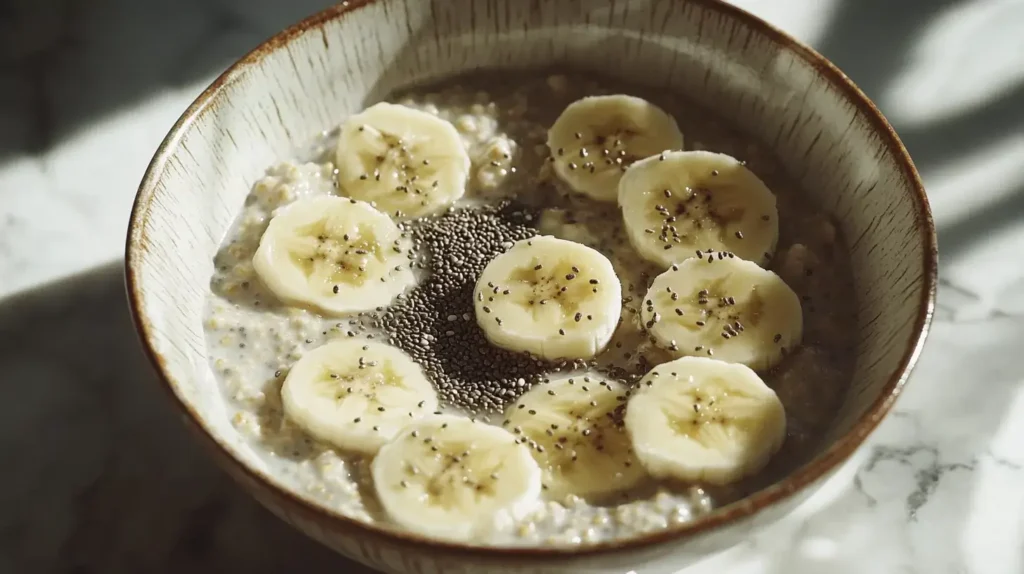
Comparing Preparation Methods
Healthy Ways to Prepare Oatmeal
You can make oatmeal healthier by choosing the right ingredients and cooking techniques, showcasing its incredible versatility.. Here are some tips for preparing a nutrient-packed bowl of oatmeal:
- Base: Use water, unsweetened almond milk, or low-fat milk to control calories.
- Sweeteners: Opt for natural sweeteners like honey, maple syrup (in moderation), or mashed bananas instead of refined sugar.
- Toppings: Boost nutrition with fresh fruits, nuts, seeds, or a dollop of nut butter. Chia seeds or flaxseeds can add fiber and omega-3s.
- Cooking Style: Overnight oats or baked oatmeal are convenient, make-ahead options for busy mornings.
By making simple swaps, oatmeal can be both delicious and highly nutritious.
Healthier Pancake Alternatives
Rethinking the ingredients allows you to make traditional pancakes healthier.. Try these alternatives:
- Flour: Replace refined flour with whole-grain, almond, or coconut flour for added fiber and nutrients.
- Sweetness: Incorporate natural sweeteners like mashed bananas or applesauce into the batter instead of adding sugar.
- Add-ins: Mix in ingredients like oats, chia seeds, or protein powder for an extra health boost.
- Cooking Method: Use non-stick pans or a small amount of healthy oils like coconut oil to reduce unnecessary fats.
Recipes like 3-ingredient oatmeal pancakes, which combine oats, eggs, and bananas, are an excellent example of how pancakes can be both healthy and satisfying.
Time and Convenience: Which Is Easier to Make?
Both oatmeal and pancakes have their convenience factors, depending on your lifestyle and routine:
- Oatmeal: Quick to prepare, especially instant or overnight oats. Minimal prep and cooking time make it ideal for busy mornings.
- Pancakes: Take a little more time due to mixing and cooking each pancake, but they’re great for batch cooking. You can freeze extras for easy reheating.
If you’re in a hurry, oatmeal is the best choice for a quick and healthy breakfast. On slower mornings, healthier pancake recipes give you a fun and flexible option.
Taste and Versatility
Flavor Variations in Oatmeal
One of oatmeal’s strengths is its adaptability to different flavor profiles. You can customize your oatmeal to suit your taste preferences or nutritional needs. Here are some popular variations:
- Sweet Oatmeal: Add fresh fruits like berries, sliced bananas, or apples. Sprinkle with cinnamon, nutmeg, or a dash of vanilla extract for extra flavor.
- Savory Oatmeal: Top with a poached egg, sautéed vegetables, and a sprinkle of cheese or nutritional yeast for a hearty option.
- Seasonal Oatmeal: Incorporate pumpkin puree and spices in the fall or citrus zest in the winter for seasonal twists.
Oatmeal’s mild flavor makes it a perfect canvas for a wide variety of ingredients, giving you endless breakfast options.
Pancake Toppings and Customization Options
You can customize pancakes with an array of toppings and mix-ins, highlighting their versatility. Popular choices include:
- Classic Toppings: Butter, syrup, and powdered sugar for a traditional treat.
- Fruity Favorites: Top with fresh strawberries, blueberries, or a fruit compote for added sweetness and nutrition.
- Nutty Additions: Spread almond butter, peanut butter, or sprinkle crushed nuts for added protein and healthy fats.
- Chocolaty Indulgence: Mix in dark chocolate chips or add a drizzle of melted dark chocolate for a decadent touch.
For a healthier twist, try oat-based pancakes, such as the 3-ingredient oatmeal pancakes described here. These combine the customization potential of pancakes with the nutritional benefits of oats.
Special Dietary Needs
Gluten-Free Options: Oatmeal vs Pancakes
People with gluten sensitivities or celiac disease can modify both oatmeal and pancakes to fit a gluten-free diet:
- Oatmeal: Oats are naturally gluten-free, but cross-contamination can occur during processing. Ensure you buy certified gluten-free oats to avoid issues.
- Pancakes: Traditional pancakes made with wheat flour are not gluten-free. However, you can use gluten-free flours like almond, coconut, or a pre-made gluten-free pancake mix. Oat-based pancakes, like 3-ingredient oatmeal pancakes, are also an excellent gluten-free alternative (find the recipe here).
Vegan and Plant-Based Diet Considerations
Both oatmeal and pancakes can be tailored to meet vegan or plant-based dietary requirements:
- Oatmeal: Vegan by default when made with water or plant-based milk. Add toppings like fruits, nuts, and seeds for a nutrient-dense meal.
- Pancakes: Traditional recipes contain eggs and milk, but vegan-friendly versions use alternatives like flax eggs (ground flaxseeds mixed with water) and plant-based milk. Many oat-based pancake recipes, such as the one linked above, are naturally vegan or can easily be adapted.
Low-Carb and Keto Diet Suitability
For low-carb or keto diets, oatmeal is generally not suitable due to its high carbohydrate content. Pancakes, on the other hand, can be adapted to fit these diets by using almond flour, coconut flour, or cream cheese-based batters. While these versions won’t resemble the original taste of either dish exactly, they can be a satisfying alternative for those on restrictive diets..
Environmental Impact
Sustainability of Oats Compared to Pancake Ingredients
Experts consider oats one of the most sustainable grains because they use fewer resources, such as water and energy, to grow compared to crops like wheat or corn, often found in pancake mixes. Farmers typically grow oats with minimal chemical inputs, making them an eco-friendly choice for breakfast enthusiasts
Pancake ingredients, on the other hand, often include refined flour, eggs, and milk, all of which have higher environmental footprints. The production of refined flour involves extensive processing, while dairy farming and egg production contribute significantly to greenhouse gas emissions.
Production Footprints: Oats vs Pancakes
When we break down the environmental impact of oatmeal and pancakes:
- Oatmeal: The environmental footprint is relatively small, especially when cooked with water or plant-based milk. Oats are also often packaged in recyclable materials, adding to their sustainability.
- Pancakes: Traditional pancakes made with wheat flour, butter, and syrup have a higher footprint due to the intensive farming and processing of these ingredients. Adding plant-based or whole-grain alternatives can help reduce their overall environmental cost.
Waste Reduction
Oatmeal offers more flexibility in terms of portion control, helping to reduce food waste. Pancakes, particularly when made in larger batches, can lead to leftovers or wasted batter if not stored or used efficiently. Preparing only what you need or repurposing leftover pancakes as snacks can mitigate this.
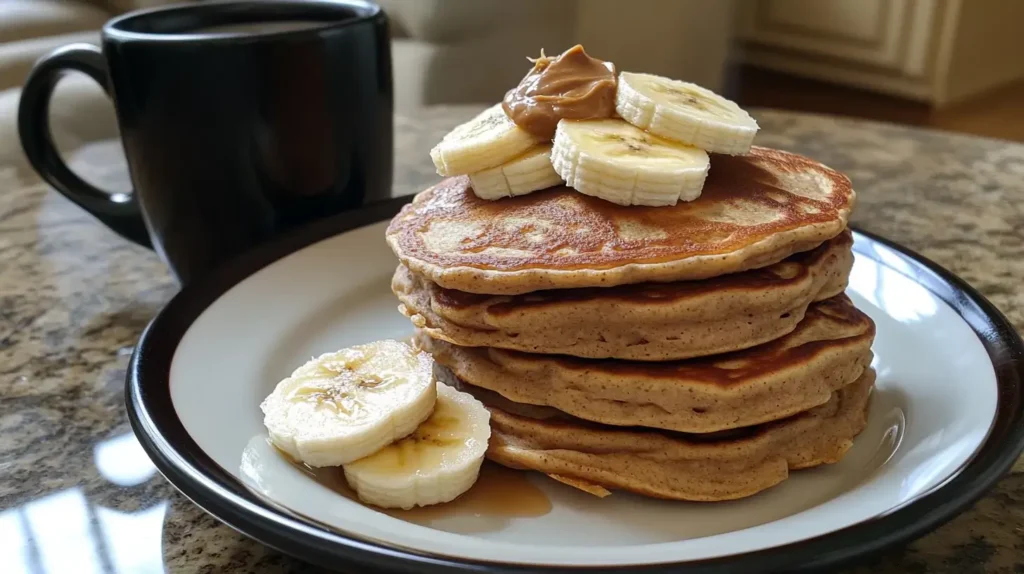
FAQs
1. Is oatmeal healthier than pancakes?
Yes, oatmeal is generally healthier than traditional pancakes due to its higher fiber content, lower glycemic index, and nutrient density. Oatmeal supports heart health, aids digestion, and provides longer-lasting energy. However, pancakes can also be healthy if made with whole-grain flour, oats, or protein-rich ingredients, and topped with nutritious options like fresh fruit or nuts.
2. Is there a downside to eating oatmeal?
While oatmeal is a nutritious choice, it can have downsides if consumed in excess or prepared with unhealthy additions like too much sugar or high-fat toppings. Some people with gluten sensitivities need to ensure they eat certified gluten-free oats to avoid cross-contamination. Eating oatmeal alone without pairing it with protein or healthy fats may also leave you feeling hungry sooner.
3. Why do some doctors say not to eat oatmeal?
Some doctors might advise against eating oatmeal for individuals with specific digestive issues, such as irritable bowel syndrome (IBS), as oats can sometimes cause bloating or gas. Additionally, instant oatmeal packets often contain added sugars and artificial flavors, which make them less healthy. It’s best to choose plain, minimally processed oats and customize them with wholesome ingredients.
4. Is oatmeal a good carb or a bad carb?
Oatmeal is a good carb because it consists of complex carbohydrates that digest slowly, providing steady energy and helping to regulate blood sugar levels. It’s also high in fiber, which supports heart and digestive health. To maximize its benefits, avoid adding too much sugar or processed toppings.
Conclusion
Choosing between oatmeal and pancakes often boils down to personal preferences and nutritional priorities. Oatmeal shines as a nutrient-dense, heart-healthy, and versatile option that supports weight management and digestive health. Its simplicity and adaptability make it a staple for health-conscious eaters.
Pancakes, while often less nutrient-dense in their traditional form, can be transformed into a healthier choice with the right ingredients and toppings. Recipes like 3-ingredient oatmeal pancakes offer a delightful middle ground, combining the nutritional benefits of oats with the indulgent appeal of pancakes.
Ultimately, both oatmeal and pancakes have their place in a balanced diet. Oatmeal may be ideal for weekday mornings when nutrition and convenience are key, while pancakes can serve as a fun and customizable option for leisurely weekend breakfasts. With thoughtful preparation and mindful ingredient choices, you can enjoy the best of both worlds!

